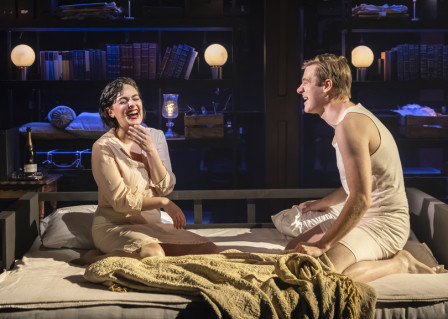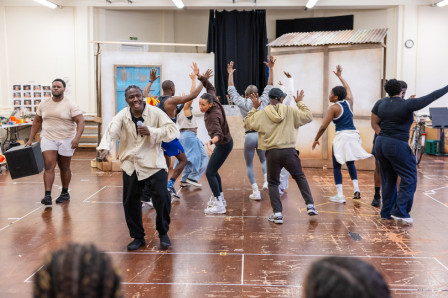Review: LOVE-LIES-BLEEDING at The Print Room at The Coronet
 Despite first being staged in in 2005, Don DeLillo's Love-Lies-Bleeding - receiving its UK debut at The Print Room at The Coronet - feels timely and totally contemporary. This perhaps owes a lot to the nature of the issues explored at the play's core, though it's also testament to DeLillo's writing, Jack McNamara's powerful staging, and strong performances from each of the cast.
Despite first being staged in in 2005, Don DeLillo's Love-Lies-Bleeding - receiving its UK debut at The Print Room at The Coronet - feels timely and totally contemporary. This perhaps owes a lot to the nature of the issues explored at the play's core, though it's also testament to DeLillo's writing, Jack McNamara's powerful staging, and strong performances from each of the cast.
Alex, an abstract artist and historical womaniser, has suffered a stroke (his second), at his isolated home somewhere in America, way out west. It's left him in a vegetative state, requiring round-the-clock care which is provided by his devoted fourth wife Lia. She cuts his nails and trims his hair, even though no one’s quite sure if either are still growing. Her plan to look after him until he dies “in nature’s time” is challenged by the arrival of Toinette (Alex’s second wife) and his estranged son, Sean, who plan on speeding up the natural process - or, to put it more bluntly, on euthanising him.
Despite only receiving a glimpse of Alex for the first half of the play, his presence lies heavy on the action: at times, the audience take his place so that the other characters address them - and him - directly, while Lily Arnold's brilliant design sees the desert sand spilling onto the stage from each flank, providing a constant physical reminder of his deteriorating existence.
Alex's proximity to the action intensifies the play’s central ethical debate, about the morality of euthanasia. Presenting one side of the argument is Lia, who believes that no one has the right to decide when a person’s life is worth living, regardless of their state of suffering. Offering an opposing perspective are Toinette and Sean, who are desperate to ease his suffering, for their own sake as much as anything else. The play's impact stems from the how convincing each character’s arguments feel. It’s troubling.
The script’s subtlety means the production takes time to fire up dramatically, though this helps to bring us close to each character before the most crucial parts of the play unfold. By the time we're given a look at a healthy, pre-stroke Alex - via an elongated flashback - we’re gripped. In fact, the flashback’s placement is in danger of diluting the debate, despite Joe McGann's performance, which breathes life into the non-responsive man we’d seen onstage in the present.
Josie Lawrence’s performance as Toinette is pitch perfect and relatable, while Jack Wilkinson and Clara Indrani deliver expertly nuanced performances. It's therefore ultimately left to the audience to make their own judgement on which course of action is the truly moral one, if any. It’s an argument which flickered across my mind long after the play ended.
Latest News

 Beautiful Little Fool at Southwark Playhouse (Borough) Review
23 January 2026 at 10:37
Beautiful Little Fool at Southwark Playhouse (Borough) Review
23 January 2026 at 10:37

 Further cast announced for UK and Ireland tour of Waitress The Musical
22 January 2026 at 11:08
Further cast announced for UK and Ireland tour of Waitress The Musical
22 January 2026 at 11:08

 Matthew Bourne's Cinderella to play festive season at Sadler's Wells
22 January 2026 at 10:33
Matthew Bourne's Cinderella to play festive season at Sadler's Wells
22 January 2026 at 10:33

 THE BOY WHO HARNESSED THE WIND - Rehearsal images released
22 January 2026 at 10:14
THE BOY WHO HARNESSED THE WIND - Rehearsal images released
22 January 2026 at 10:14
